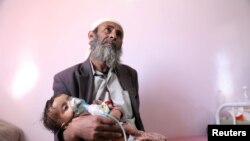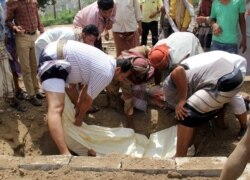The World Health Organization warns nearly 18 million people in Yemen are unable to get treatment for deadly diseases because years of war, economic distress and a chronic shortage of money have led to a collapse of the country’s healthcare system.
More than five years of escalating conflict have devastated Yemen’s economy and ability to provide enough food and medical care to keep its population healthy.
World Health Organization officials report only half of the country’s health facilities are fully functioning. And those that remain open suffer from severe shortages of qualified staff, essential medicines and supplies.
WHO spokesman Tarik Jasarevic says that for three years, appalling socio-economic conditions in Yemen have caused a spiraling of deadly diseases including the worst cholera outbreak in modern times, as well as epidemics of diphtheria, dengue, measles and malaria.
“Now we have also COVID-19 and, unfortunately, we have cases of polio coming back to Yemen after it has been declared as a polio-free country," Jasarevic said. "And, for people who have chronic diseases, such as cancer, diabetes, or others, the treatment is limited.”
WHO reports 2,065 confirmed cases of COVID-19, including more than 600 deaths. It notes two new cases of vaccine derived cases of polio have been confirmed. The outbreak of this extremely contagious disease has paralyzed 17 children.
Jasarevic says armed conflict and political instability have disrupted the delivery of essential healthcare supplies. He tells VOA the Sanaa International Airport has not been in operation since September 9th and this is a major obstruction in efforts to respond to COVID-19 and other diseases.
“According to our office there, this has delayed arrival of COVID-19 experts, the arrival of critical medical but also other humanitarian supplies that include 207 tons of COVID-19 response equipment," Jasarevic said.
Jasarevic says WHO is critically short of money to fund its humanitarian operation. He says the agency has received less than half of the $164.5 million it needs. Unless money is urgently received, he warns nine million people will lose access to basic health care services by the end of the year.
In addition, he says as many as 18 million people, including six million children will be deprived of the life-saving vaccines to immunize them against deadly diseases such as measles and polio.






